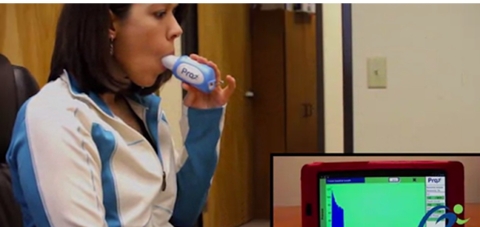

Scientists are looking for volunteers to see if the breathing muscles can be trained to help people's recovery from Covid-19
24 September 2020
3 min read
Breathing experts exploring a new method to help people recover from Covid-19, using breathing exercises and a hand-held device, are looking for volunteers who have had Covid-19 to help them test it. The work could benefit patients and ease the strain on the NHS.
More people are now surviving Covid-19. However, patients who are recovering talk about continued shortness of breath, sometimes for many months, which causes tiredness and difficulties with the basic tasks of daily living.
A team of scientists are now looking for volunteers to see if the breathing muscles can be trained to help people recover more quickly and fully. Participants can take part from anywhere in the UK as the training and testing can be done remotely.
Dr Zoe Saynor from the University of Portsmouth is part of the UK-wide team, led by Drs Melitta McNarry and Kelly Mackintosh at Swansea University.
There is a real need to develop safe and effective home-based rehabilitation methods for people who are recovering from COVID-19.
Dr Zoe Saynor , Senior Lecturer
Dr Saynor, from the School of Sport, Health and Exercise Science at the University of Portsmouth, has done extensive research on exercise testing, training and nutrition in the treatment and prevention of chronic diseases and has also been looking at the effects of Covid-19 restrictions on physical activity, wellbeing and mental health.
She said: “There is a real need to develop safe and effective home-based rehabilitation methods for people who are recovering from Covid-19. We know that training the breathing muscles can make them stronger, as with other muscles in the body. We believe that this type of training may help people recovering from Covid, by making them less breathless and hopefully make exercise easier and more comfortable like it was before they had Covid. The hope is this will also have a big effect on how people feel mentally, too.”
The study is open to anyone who has had Covid-19 - it doesn’t matter how long ago or where they live.
The breathing training requires the use of a small handheld device that gives regular feedback to the user. To use the device, people breathe in as deeply as they can, for as long as they can.
Participants will be provided with their own device to do breathing exercises three times a week for eight weeks and the results will be compared with participants in a control group who have had no intervention.
Based on previous work with long-term respiratory conditions, doing these exercises just three times a week for about 20 minutes has been linked to improvements in how people feel and how much they can move around.
Researchers will study whether people get less breathless, stronger, fitter, move around more and, importantly, whether they feel better about their health and well-being. Each volunteer will get regular feedback on how they are doing and plenty of motivation to keep going.
Associate Professor McNarry, an expert in cardiorespiratory health has worked with people with many types of respiratory conditions such as chronic obstructive pulmonary disease, asthma and cystic fibrosis. She helps them improve their breathing through inspiratory muscle training, high-intensity interval training and physical activity. She has also worked with clinicians to improve pulmonary rehabilitation programmes for patients with respiratory disease.
Dr McNarry said: “It is great news that more and more people are now surviving Covid. But it’s vital that we now focus on rehabilitation, so that people recover quickly and fully. To do this, we need a greater understanding of the long-term effects of Covid-19 and how we can make these better.
“We can only do this with the help of volunteers. That’s why we’re asking people who are recovering from Covid to consider taking part in our research.
“You can be an adult of any age, from any part of the UK and it doesn’t matter how long ago you had Covid. If you think you may be interested, I’d be delighted to hear from you. I can tell you a bit more about the work and answer any questions you may have, so you can decide if you’re able to help.”
The research project has just been awarded funding from the Sêr Cymru programme, run by the Welsh Government.
Recovering from Covid? If you think you may be able to help, contact Dr McNarry on 01792 513069 or email m.mcnarry@swansea.ac.uk, or email Dr Saynor zoe.saynor@port.ac.uk
